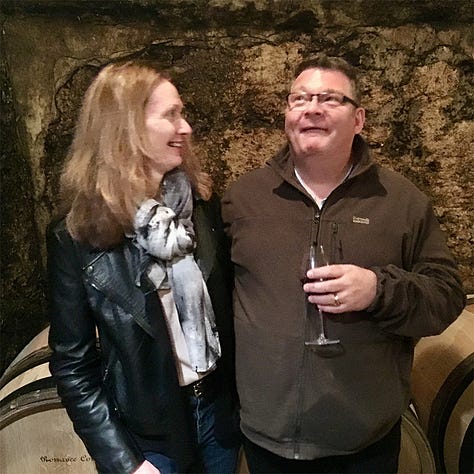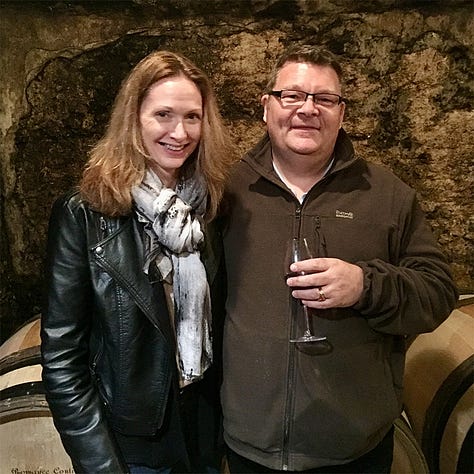No Saints Allowed
Good wine criticism demands a degree of detachment
I enjoy reading criticism—of books, art, cinema, architecture. As a fine artist and writer (who herself writes criticism), I find it instructive to see how critics from various domains approach the exercise.
I was particularly struck reading a recent New Yorker piece, an essay by Julian Lucas reflecting on the critic Hilton Als’s profile of author Derek Walcott. That’s meta, I know: a writer writing about a critic writing about an author. But the piece was part of The New Yorker’s 100-year anniversary series called Takes, in which a present-day commentator provides a fresh “take” on material from the archives, usually a profile of a person, place, or thing.
Lucas was ruminating on the approach Als had taken in profiling this famous but also complicated author. He noted that Als could have written a “moralizing takedown,” or alternatively penned a “dutiful hagiography.” Instead, “Als simply arrived on the beach—sunglasses and folding chair in hand—and set out to discover how such an imperfect man wrote such extraordinary work.”
It was that phrase, “dutiful hagiography,” that reached out from the page and grabbed me by the collar. Because who among us has not read such a profile of a winemaker, or even of a particular wine itself, in the pages of a contemporary wine magazine?



Wine is an experience good, demanding both subjective and objective evaluation. It’s also an inherently social product, and so the wine industry is likewise social and small enough that relationships among its dramatis personae, producers and writers alike, create propulsive force. Our work repeatedly invites us to confront a key question of criticism: Is it possible to be objective about a subject when the subject is people, especially people you know and like?
On the whole, writers tend to respect producers and the work required to place an aesthetic product into the hands (glasses) of the market. We are, generally, polite; you will rarely see a “moralizing takedown” in a magazine except in the rare instances of a deep transgression: worker abuse, fraud, environmental demolition.
Some wines are indeed iconic (some vineyards and territories, too), their goodness agreed by generational consensus. Some people are likewise icons, their reputations formed from a collage of commentary about their life’s work. We respect the tiny climat for what it is. We respect the grande dame for what she does. There is irrefutable proof of their overall excellence, despite a few quibbles over foibles.
But the reader isn’t served by a “dutiful hagiography,” even of these enduring characters. Our work is to interpret and contextualize rather than lionize. Not that we need to muckrake as a matter of policy, but we do need to research and write with circumspection, to question received wisdom, to visit and taste for ourselves, to talk not only with the principal but also the cellar hand, to pull up our “sunglasses and folding chair” and watch for a while to see how the work gets done.
A wine may deliver epiphanies or may simply be banal, but our job is to understand how and why so we may arm readers with insights before they taste for themselves.
Ed. note: A version of this essay was originally published in The Circular with the title Considering Criticism.




I would aver that a “dutiful hagiography” could still include subjective commentary, provided that the author is able to separate the person (or subject) from whatever is being reviewed.
This delves into the idea of whether the author is a wine critic or a wine writer; I don’t look to James Suckling, Allen Meadows, or Jeb Dunnuck for exquisitely-crafted portraits of a winemaker, winery, (or their children or dogs), any more that I’d want to see scores and laundry lists of tasting notes from a Matt Kramer, Kathleen Willcox, or Gerald Asher. Not that either category of writer would be incapable of finessing the other side’s style, but people do gravitate to what they do best, and the writers working from their comfort zone are the writers who make reading about wine more interesting, whether I’m reading for the romance of wine or just for the reviews.
A good writer can make that distinction without too much of a disconnect. An interesting person will be a good subject for a story even if they’re wine isn’t exactly all it should be. E.g. this evening’s Central California natural Trousseau that was brett-ridden, mousy, and oxidized, but made by an otherwise usually gifted winemaker who screwed up on this one. Great story, lousy wine, someone call in the guys in the hazmat suits to remove this from the premises. But I’d drink other wines from him in the future, thus a compelling story about the winemaker, accompanied by disturbing tasting notes (and memories) and a score for the wine that you’re not going to see on a shelf hanger.
This doesn’t account for the dictates/needs for a story in modern-day “pay-to-play” publishing situations. If I wine truly sucks, but was submitted by an advertiser, editorial will probably find a way to minimize the review while highlighting the story. That’s what editors are for, right? So whether delivering epiphanies or simply being banal, a wine (or winemaker) can serve two master when it comes to a writer’s POV, depending on the publication’s end goal. Crazy business we’re in, no?